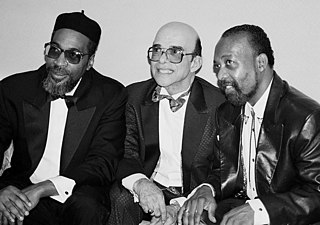Philadelphia soul, sometimes called Philly soul, the Philadelphia sound, Phillysound, or The Sound of Philadelphia (TSOP), is a genre of late 1960s–1970s soul music characterized by funk influences and lush instrumental arrangements, often featuring sweeping strings and piercing horns. The genre laid the groundwork for disco by fusing the R&B rhythm sections of the 1960s with the pop vocal tradition and featuring a slightly more pronounced jazz influence in its melodic structures and arrangements. Fred Wesley, the trombonist of the James Brown band and Parliament-Funkadelic, described the signature deep but orchestrated sound as "putting the bow tie on funk."

The Trammps are an American disco and soul band, who were based in Philadelphia and were one of the first disco bands.
MFSB, officially standing for "Mother Father Sister Brother", was a pool of more than 30 studio musicians based at Philadelphia's Sigma Sound Studios. They worked closely with the production team of Gamble and Huff and producer/arranger Thom Bell, and backed up Harold Melvin & the Blue Notes, the O'Jays, the Stylistics, the Spinners, Wilson Pickett, and Billy Paul.

McFadden and Whitehead were an American R&B duo, best known for their signature tune "Ain't No Stoppin' Us Now". They wrote and produced some of the most popular R&B hits of the 1970s, and were primarily associated with the Gamble and Huff record label, Philadelphia International Records.
Thomas Randolph Bell was an American record producer, arranger and songwriter known as one of the creators of Philadelphia soul in the 1970s. Hailed as one of the most prolific R&B songwriters and producers ever, Bell found success crafting songs for Delfonics, Stylistics, and Spinners. In June 2006, Bell was inducted into the Songwriters Hall of Fame. In 2016, Bell was inducted into the Musicians Hall of Fame and Museum.

Kenneth Gamble and Leon A. Huff are an American songwriting and production team credited for developing the Philadelphia soul music genre of the 1970s. In addition to forming their own label, Philadelphia International Records, Gamble and Huff have written and produced 175 gold and platinum records, earning them an induction into the Rock and Roll Hall of Fame in the non-performer category in March 2008.
Philadelphia International Records (PIR) was an American record label based in Philadelphia, Pennsylvania. It was founded in 1971 by songwriting and production duo Kenneth Gamble and Leon Huff along with their longtime collaborator Thom Bell. It was known for showcasing the Philadelphia soul music genre that was founded on the gospel, doo-wop and soul music of the time. This sound later marked a prominent and distinct era within the R&B genre. During the 1970s, the label released a string of worldwide hits that emphasized lavish orchestral instrumentation, heavy bass and driving percussion.

The Intruders were an American soul music group most popular in the 1960s and 1970s. As one of the first groups to have hit songs under the direction of Kenny Gamble and Leon Huff, they were a major influence on the development of Philadelphia soul.
Thomas Jerome Moulton is an American record producer. He experimented with remix in disco music and this led to its wide adoption as a standard practice in the industry. He also invented the breakdown section, and the twelve-inch single vinyl format in the process.
Vincent Montana Jr., known as Vince Montana, was an American composer, arranger, vibraphonist, and percussionist. He is best known as a member of MFSB and as the founder of the Salsoul Orchestra. He has been called "the Godfather of disco". Montana was inducted into the Musicians Hall of Fame and Museum in 2016.
The Salsoul Orchestra was the backing band of session musicians for many acts on the New York City label Salsoul Records and, under its own name, recorded several hit singles and albums between 1975 and 1982.

The Force is the ninth studio album by the funk band Kool & the Gang, released in 1977 on De-Lite Records. The album peaked at No. 33 on the US Billboard Top R&B/Hip-Hop Albums chart.
Walter "Bunny" Sigler was an American R&B singer, songwriter, multi-instrumentalist and record producer who did extensive work with the team of Kenny Gamble and Leon Huff, and was instrumental in creating the "Philly Sound" in the early 1970s.
Dexter Gilman Wansel is an American R&B/jazz fusion singer, arranger, musician, composer, conductor, synthesist and A&R director.

Earl Donald Young is a Philadelphia-based drummer who rose to prominence in the early 1970s as part of the Philly Soul sound. Young is best known as the founder and leader of The Trammps who had a hit record with "Disco Inferno". Young, along with Ronnie Baker and Norman Harris, was the owner of the Golden Fleece record label.

"I'll Be Around" is a song recorded by the American R&B vocal group The Spinners. It was co-written by Thom Bell and Phil Hurtt and produced by Bell.
Bobby Eli was an American musician, arranger, composer and record producer from Philadelphia. He was a founding member and lead guitarist of Philadelphia studio band MFSB.
"I'll Always Love My Mama" is a 1973 single by the Philly soul group The Intruders. Released from their album Save the Children, the single is a song commonly played on Mother's Day.

Songs I'll Always Sing is a two-record compilation album by American country music singer and songwriter Merle Haggard, released in 1977. It reached No. 15 on the US Country Charts. The album collects many of Haggard's best known recordings during his successful run at Capitol Records, including nine of his twenty-four No. 1 hits, dating back to 1966.
Thomas Joshua Tindall was an American guitarist. He was a member of MFSB and played on 38 gold and platinum funk and R&B records and more than 30 hits produced by Gamble and Huff in the 1970s and 1980s. Tindall is considered one of the architects of the Philadelphia Sound. He was inducted twice into the Philadelphia Music Alliance's Walk of Fame as a member of MFSB and the Salsoul Orchestra.








